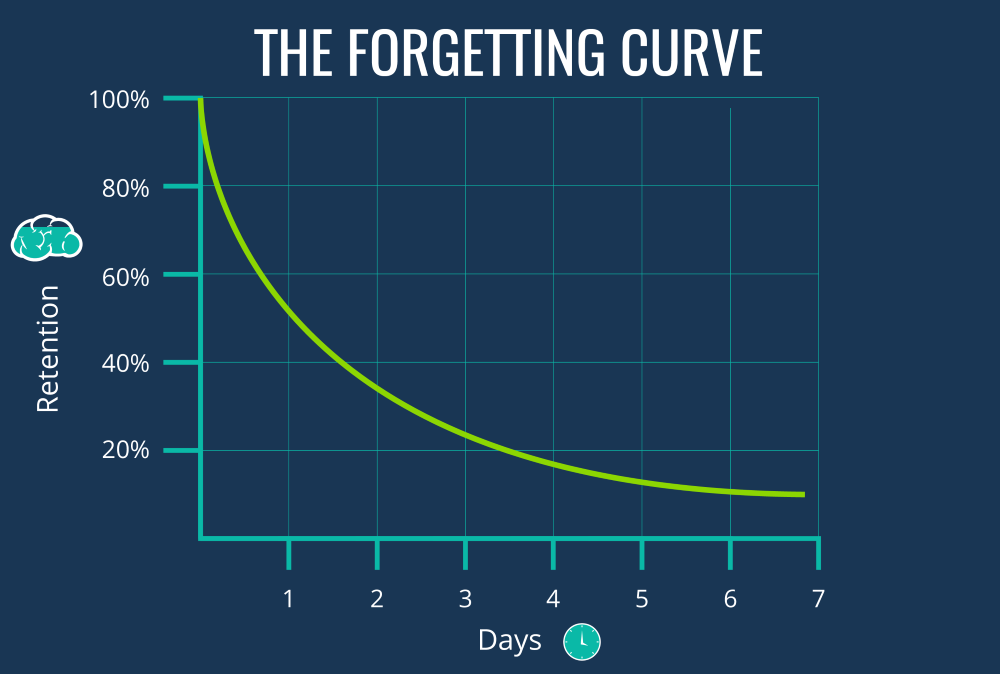Vocab Set | Module 2.7 [Forgetting] | AP Psych Unit 2
1/14
Earn XP
Description and Tags
Name | Mastery | Learn | Test | Matching | Spaced | Call with Kai |
|---|
No analytics yet
Send a link to your students to track their progress
15 Terms
Forgetting Curve
A graph that shows how memory retention decreases over time, with the most significant forgetting happening soon after learning, followed by a slower rate of forgetting.
Example: After learning new information, you may forget a large portion of it within the first few hours or days, but the amount of forgetting slows down over the next few weeks.

Encoding Failure
The inability to convert information into a form that can be stored in memory. This happens when we don’t pay enough attention to the information or fail to deeply process it.
Example: Forgetting someone’s name after meeting them because you didn’t focus on it enough to encode it into memory.
Proactive Interference
The forward-acting disruptive effect of older learning on the recall of new learning, where previously learned information interferes with the ability to remember new information.
Example: Calling your teacher by her maiden name after she has recently married and changed her last name.
Retroactive Interference
The backward-acting disruptive effect of newer learning on the recall of older information, where new information interferes with the ability to remember old information.
Example: Failing to remember your old address after you moved because the new address interferes with the recall of the old one.
Retrieval Failure
The inability to access stored information from memory, even though it is there, because the right retrieval cues are not available.
Example: You can’t remember the name of a song you know well, even though it’s in your memory, because you can't access it at the moment.
Tip-of-the-Tongue Phenomenon
A state in which you are unable to retrieve a word or piece of information from memory, even though you feel like it is just on the verge of being recalled.
Example: You know the name of an actor, but it’s on the tip of your tongue and you can’t quite remember it, even though you’re sure you know it.
Motivated Forgetting / Repression (Psychodynamic)
The unconscious blocking or deliberate attempt to forget unpleasant or anxiety-provoking memories, often to protect the individual from emotional distress.
Example: A person may unconsciously forget a traumatic childhood event, or someone might consciously try to forget a stressful argument with a friend.
Anterograde Amnesia
A condition where an individual is unable to form new memories after a brain injury or trauma, while their long-term memories before the event remain intact.
Example: After a car accident, a person might not be able to remember new information, like meeting someone new or what happened earlier in the day, but they can recall past events from before the accident.
Retrograde Amnesia
A condition where a person is unable to recall memories from before a specific event, such as a brain injury or trauma, but can form new memories after the incident.
Example: After a car accident, a person may not remember events from the past few years, such as a recent vacation, but they can recall earlier childhood memories and form new ones moving forward.
Infantile Amnesia
The inability to recall events from early childhood, often attributed to the underdevelopment of brain structures and the lack of language skills needed to form and retrieve memories.
Example: A person may not remember their first steps or early experiences because their brain and language abilities were not developed enough at that time to store and retrieve those memories.
Source Amnesia
The inability to remember the source of information, such as how, where, or when it was learned, despite being able to recall the information itself.
Example: You might know a piece of trivia but cannot remember whether you learned it from a book, a conversation, or a documentary.
Misinformation Effect
A phenomenon where misleading or incorrect information alters or distorts one's memory of an event.
Example: After watching a video of a car accident, hearing someone say "the car ran a red light" might cause you to falsely remember the car running the red light, even if it didn't.
Constructive Memory
The process by which our brains actively fill in gaps in our memory, often blending real and imagined details, which can lead to inaccurate or distorted memories.
Example: Remembering a childhood event in detail, but later realizing that some parts of the memory were influenced by stories you were told or photos you've seen, not by the actual experience.
Memory Consolidation
The process by which short-term memories are transformed into long-term memories through rehearsal and neural activity.
Example: Studying for an exam helps move the information from short-term memory into long-term memory, making it easier to recall later.
Imagination Inflation
The phenomenon where imagining an event increases the confidence that it actually happened, leading to the creation of false memories.
Example: After imagining a childhood event in detail, you may become more convinced that it actually occurred, even if it didn't.